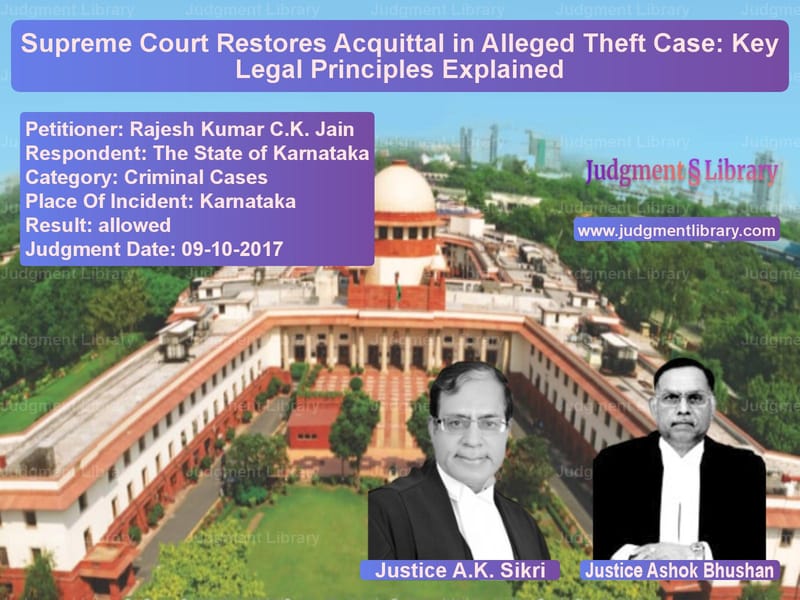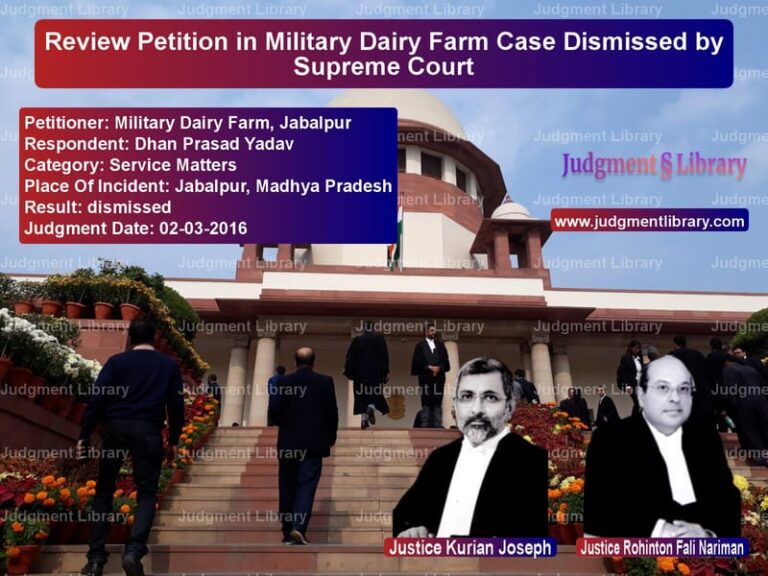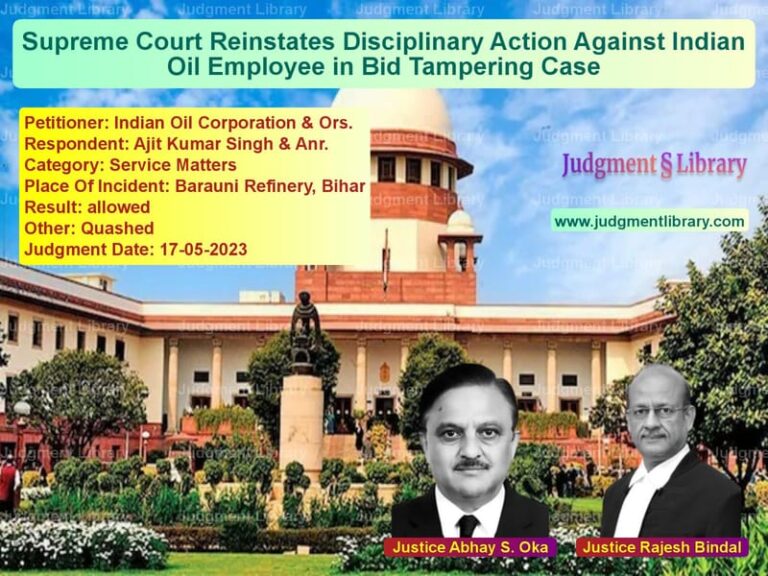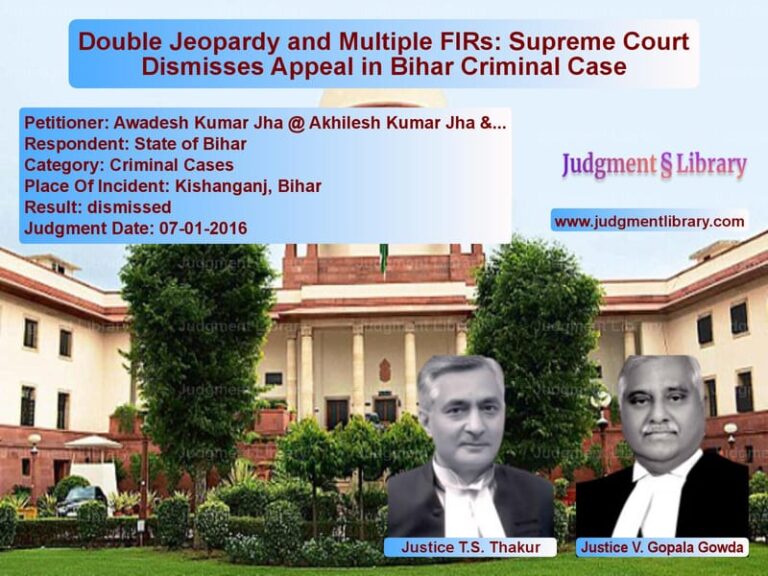Supreme Court Restores Acquittal in Alleged Theft Case: Key Legal Principles Explained
The Supreme Court of India recently ruled in the case of Rajesh Kumar C.K. Jain vs. The State of Karnataka, overturning a High Court order that had set aside an acquittal and remanded the case for reconsideration. The case involved an alleged theft of a settlement bond and raised important questions about the evaluation of evidence in criminal trials.
The appellant, Rajesh Kumar C.K. Jain, was initially convicted under Section 379 IPC (theft) and Section 201 IPC (causing disappearance of evidence). However, the Sessions Court overturned the conviction, acquitting the accused due to insufficient evidence. The Karnataka High Court later reversed this acquittal and remanded the case for fresh consideration. The Supreme Court, after reviewing the entire case, restored the acquittal, emphasizing the necessity of proving guilt beyond a reasonable doubt.
Background of the Case
The dispute originated from a pending case before the Assistant Commissioner, Yadgiri, regarding land records related to Sy. Nos. 188, 189, and 190. The prosecution alleged that:
- A settlement agreement was reached between the parties and recorded on a bond paper of Rs.100.
- On July 16, 2010, at around 12:00 noon, the accused allegedly took the bond paper from the case file without permission.
- The accused later returned at 4:00 PM and, when questioned, apologized and promised to return the bond the next day.
- When the accused failed to return the bond, PW2 lodged a police complaint on July 18, 2010, leading to his prosecution.
The trial court convicted the accused based on the prosecution’s witnesses and evidence, sentencing him to:
- One year of simple imprisonment under Section 379 IPC
- Nine months of simple imprisonment under Section 201 IPC
The accused appealed the conviction before the Sessions Court, Yadgiri, which set aside the conviction on March 24, 2016, citing lack of evidence. The Karnataka High Court subsequently overturned the acquittal and remanded the case for reconsideration.
Arguments of the Appellant (Accused)
The appellant argued before the Supreme Court that:
- The prosecution failed to establish the existence of the alleged settlement bond.
- The Investigating Officer (I.O.) did not record statements from the other two signatories of the settlement.
- There was no independent corroboration that the accused had taken the bond from the file.
- The trial court relied on statements from PW2 to PW6 without properly considering cross-examinations.
- The accused had no motive to steal the document, as he had denied any settlement agreement existed.
Arguments of the Respondent (State of Karnataka)
The prosecution countered that:
- The accused had admitted to taking the document and later claimed to have torn it up and thrown it in a river.
- The police had sufficient evidence, including statements from office staff, to establish theft.
- The Sessions Court had erred in disregarding the prosecution’s evidence.
- The High Court was correct in setting aside the acquittal and ordering fresh consideration.
Supreme Court’s Key Findings
After reviewing the case, the Supreme Court ruled in favor of the appellant and restored the Sessions Court’s acquittal. The Court observed:
“The Appellate Court has thoroughly considered each and every material available on record. The observation of the High Court that the Sessions Judge had not looked into the materials available on record is not factually correct.”
The Supreme Court emphasized the following key points:
- The prosecution failed to prove beyond reasonable doubt that the settlement bond even existed.
- The trial court had relied on the prosecution’s examination-in-chief without giving due consideration to the cross-examination.
- The prosecution did not call upon the other two alleged signatories of the settlement bond to confirm its authenticity.
- The police’s claim that the accused admitted to stealing and destroying the bond was inadmissible under Sections 25 and 26 of the Indian Evidence Act.
- Since no recovery of the bond was made under Section 27 of the Indian Evidence Act, the alleged confession was not legally valid.
Final Judgment
The Supreme Court ruled:
- The High Court’s order setting aside the acquittal was erroneous.
- The findings of the Sessions Court were correct and supported by sufficient reasoning.
- The accused’s acquittal was restored, and the case was closed.
Key Takeaways from the Judgment
The ruling establishes several important legal principles:
- Presumption of Innocence: Acquittals should not be overturned without strong reasons supported by evidence.
- Burden of Proof: The prosecution must prove the existence of stolen items before convicting an accused of theft.
- Reliability of Witness Testimony: Courts must consider cross-examinations and not rely solely on direct testimony.
- Admissibility of Confessions: Statements made to police officers without proper recovery of evidence are inadmissible under the Indian Evidence Act.
- Judicial Scrutiny in Criminal Cases: Higher courts must ensure that acquittals are not set aside lightly.
Legal Implications of the Judgment
This Supreme Court ruling reinforces the importance of due process in criminal cases:
- It underscores that appellate courts must have strong justifications to overturn acquittals.
- It clarifies that a mere allegation of theft is not sufficient for conviction.
- It ensures that police confessions are scrutinized under the Indian Evidence Act before being admitted as proof.
Conclusion
The Supreme Court’s decision in Rajesh Kumar C.K. Jain vs. The State of Karnataka reaffirms the fundamental principle that an accused is innocent until proven guilty beyond a reasonable doubt. By restoring the acquittal, the Court has reinforced the necessity of evaluating evidence rigorously and ensuring that judicial processes are not misused to convict individuals based on weak or insufficient evidence. This case will serve as an important reference for future criminal trials, especially those involving allegations of theft and evidentiary admissibility.
Don’t miss out on the full details! Download the complete judgment in PDF format below and gain valuable insights instantly!
Download Judgment: Rajesh Kumar C.K. Ja vs The State of Karnata Supreme Court of India Judgment Dated 09-10-2017.pdf
Direct Downlaod Judgment: Direct downlaod this Judgment
See all petitions in Bail and Anticipatory Bail
See all petitions in Fraud and Forgery
See all petitions in Theft and Robbery Cases
See all petitions in Judgment by A.K. Sikri
See all petitions in Judgment by Ashok Bhushan
See all petitions in allowed
See all petitions in supreme court of India judgments October 2017
See all petitions in 2017 judgments
See all posts in Criminal Cases Category
See all allowed petitions in Criminal Cases Category
See all Dismissed petitions in Criminal Cases Category
See all partially allowed petitions in Criminal Cases Category







